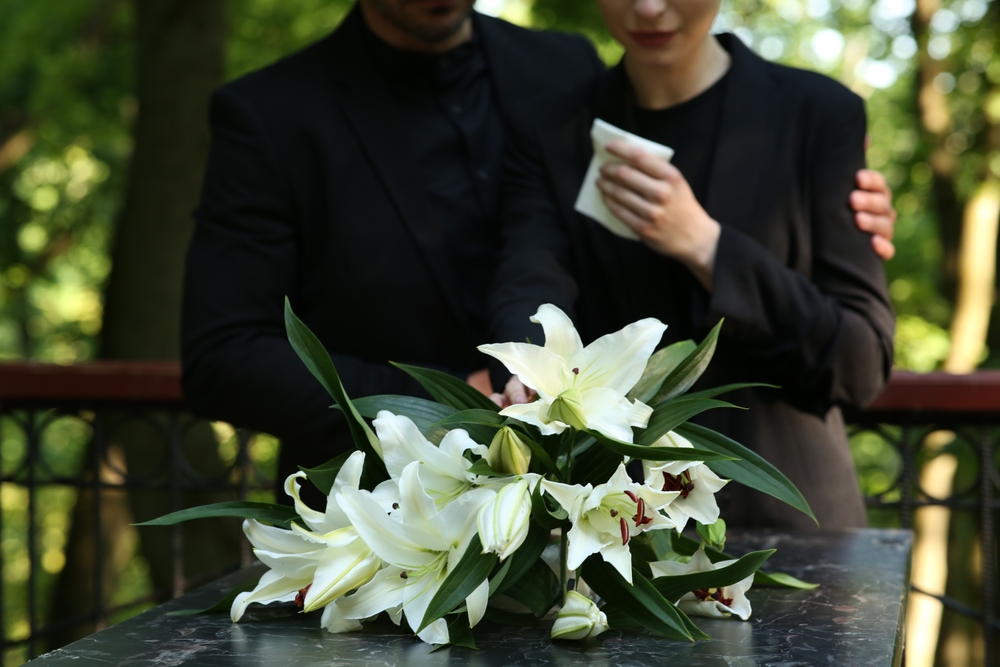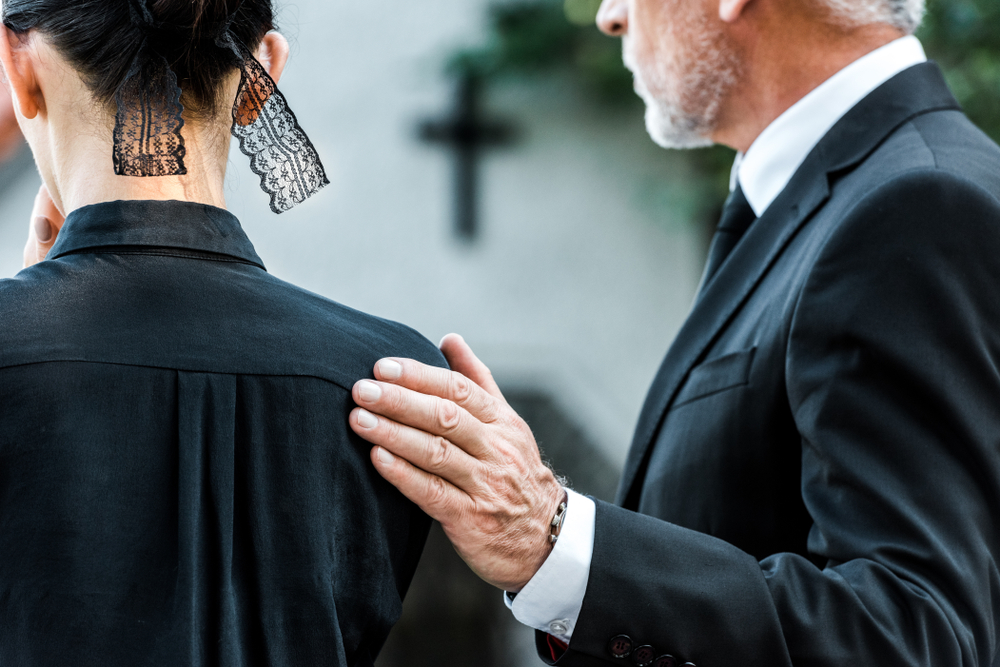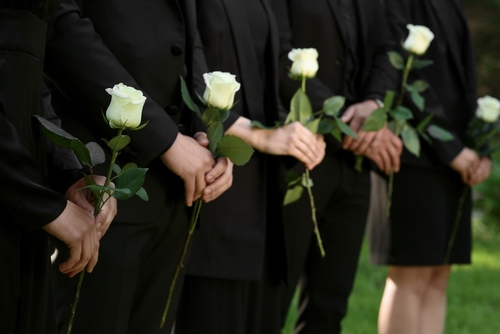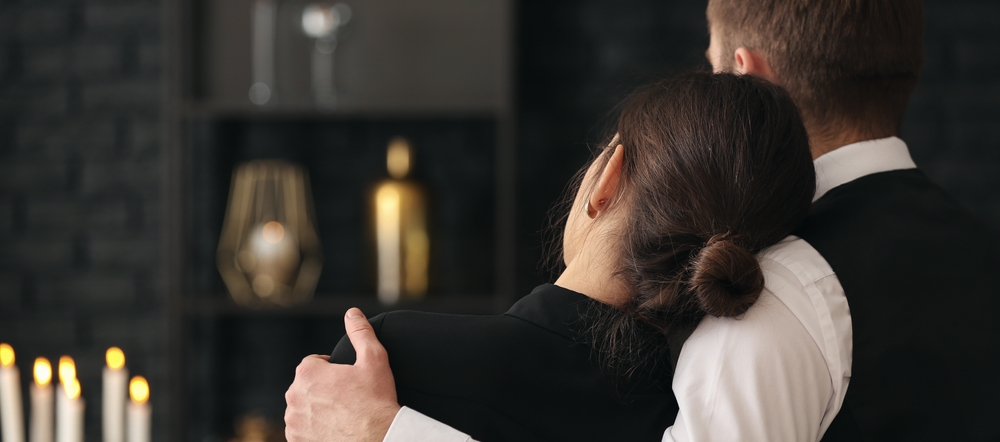The death of a loved one is a profound and painful event. As you plan their funeral, you may wonder: is this really goodbye? Or are there ways to maintain an ongoing spiritual connection?
This guide explores the complex role funerals play in grieving and letting go.
What is the purpose of a funeral?
Funerals serve several purposes for mourners and the wider community:
- A collective goodbye – They provide a ritualised means for groups to acknowledge the loss together. This offers support.
- A point of closure – The finality of committal helps loved ones start emotionally processing the death.
- An honouring of life – Speeches, rites and ceremonies celebrate the deceased’s existence.
- An aid to grieving – Gathering together to share grief makes mourning collectively cathartic.
- A public record – Obituaries formally announce the death and key aspects of the departed’s life.
- A practical necessity – Disposal of remains is required for public health. Funerals facilitate this respectfully.
So while an element of goodbye is inherent in funerals, they serve many additional emotional and practical purposes.

Does having a funeral help with closure?
Yes, holding a meaningful funeral service can provide:
- A sense of finality – Seeing the deceased ‘laid to rest’ helps mourners grasp their passing.
- Reality of loss – Rituals reinforce the permanence and reality of death. This promotes acceptance.
- Permission to grieve – Public grieving at the ceremony allows pent up emotion to be released.
- Support network – Shared grief brings consolation and forges bonds between fellow mourners.
- Positive focus – Celebrating the deceased’s life recalibrates loss into appreciation.
- Spiritual connection – Faith-based elements offer continuance of relationship in the afterlife.
However, closure should not be rushed. Progress through the stages of grief occurs gradually. Services giving thanks for memories can assist this transition.
Does having no funeral make grieving harder?
Lacking a funeral service can detrimentally impact mourning by:
- Removing a significant ritualised goodbye.
- Denying a supportive public grieving experience.
- Allowing avoidance and denial to persist.
- Removing a point of community acknowledgement and closure.
- Failing to formally recognise the deceased’s life.
- Potentially leaving the bereaved feeling the death was ‘swept under the carpet’.
That said, some opt against funeral services for personal or religious reasons. Alternative memorials and private rituals can still provide meaningful closure.
Therapeutic support helps mitigate effects of an absent funeral.
Can I hold a funeral if there is no body?

Yes, meaningful funerals can still be held without the deceased’s body present, for example:
After cremation – The ashes may be present or scattered already. Services focus on memorialising the person.
Body not recovered – After accidents at sea or disasters. Offer prayers, readings, tributes.
Body donated to science – The deceased wished to donate their remains to medical research.
Virtual funerals – Allow services to take place remotely when gatherings are impossible.
While perhaps harder emotionally without the body, committing the spirit or memory of the departed provides a ritualised goodbye. Guests can still share grief and gain consolation.
Human ashes or memorial stones may represent the deceased. Focus is placed on celebrating a life well-lived rather than the physical remains.
Can a funeral provide a sense of peace?
Yes, well-conducted funeral services can impart peace through:
- Farewell rituals that provide satisfying closure.
- Hearing meaningful eulogies summarising a life.
- Expressing grief honestly and being supported.
- Feeling the deceased has been honoured.
- Knowing relationships continue in memories and spirit.
- Recognising the inevitability of mortality.
- Finding meaning in loss by affirming values and loves shared.
- Appreciating ongoing connections through those whose lives the deceased touched.
However, funerals are not meant to ‘instantly cure’ grief – that will take time. Services simply aim to start mourners on that journey with love and solace.
Do different cultures have different funeral customs?
Yes, funeral rites vary enormously globally based on:
- Religious beliefs – Christian, Hindu, Buddhist, Muslim, Jewish traditions differ.
- Cultural norms and superstitions.
- Community expectations around grieving.
- Whether cremation or burial is traditional.
- If ongoing remembrance is customary.
- Whether lively celebrations or sombre gravitas is favoured.
However, common ground exists – all cultures’ funeral customs provide a means of honouring the dead and supporting the bereaved. Openness to different traditions can be unifying.
As with all points raised within this article, you should discuss any faith-based or cultural customs you wish incorporated with your local funeral directors, such as Simple Send-offs. Most welcome celebrating the uniqueness of a life according to your wishes.

How can I personalise a funeral service?
To make it truly reflective of your loved one, consider:
- Readings – Choose meaningful passages or poems to be read aloud.
- Music – Select special songs or hymns to play.
- Dress code – Smart black, casual, colourful? Set expectations.
- Flowers – Portray the deceased’s favourite blooms or colours.
- Casket – Tailor this to their personality with colour or motifs.
- Photos – Display boards showing their life highlights.
- Keepsakes – Have guests take symbolic gifts like seeds.
- Refreshments – Cater foods the deceased loved.
- Eulogies – Gather speeches from diverse friends and family.
- Rituals – Include any cultural traditions desired.
Can funeral rituals provide comfort?
Certain rituals can be powerful sources of solace and meaning during services:
- Candle lighting – Representing cherished memories being kept alive.
- Flower scattering – Saying farewell while committing the body.
- Handing earth – Placing earth in the grave symbolically.
- Washing stones – Cleansing in Jewish traditions.
- Releasing doves – Representing the spirit flying free.
- Memory boxes – Filling with keepsakes, notes, photos.
- Sharing food – Communal eating as an act of fellowship.
- Tying ribbons – Gathering together to adorn the coffin.
- Balloon release – Seeing hopes fly high.
Discuss any desired symbolic acts with your funeral celebrant. Ritual provides powerful catharsis.
Can I request an unusual funeral?
Today’s funerals need not follow traditional sombre formulas. Instead, reflect the deceased’s personality with creative touches:
- Use a favourite song as a coffin entry procession.
- Release butterflies to symbolise transformations after death.
- Perform a dance honouring their zest for life.
- Make attendees dress code vibrant colours rather than black.
- Screen a slideshow of photos from their adventures.
- Serve bespoke cocktails fitting their character.
- Select a quirky coffin design or décor.
- Release fireworks or lanterns to spectacular effect.
- Share candid, humorous stories rather than staid eulogies.
While unusual funerals may not suit all, honouring a life in novel ways can greatly comfort grieving relatives.
Can a humanist funeral provide closure?
Yes. Humanist ceremonies provide non-religious options focused on:
- Celebrating the personality of the deceased.
- Reflecting on memories that defined them.
- Finding meaning in the impacts they had on others.
- Affirming the values by which they lived.
- Acknowledging the grief felt at their passing.
- Capturing their unique story without reference to an afterlife.
- Allowing loved ones to say farewell in their own words.
Humanist officiants help shape highly personal, meaningful occasions, crafted for the bereaved. These still impart closure through commemorating a life fully lived.

How can funeral ceremonies bring comfort?
Elements of funeral ceremonies that commonly bring peace include:
- Readings – Hearing meaningful texts or poems read aloud.
- Eulogies – Listening to anecdotes summarising their life.
- Music – Special songs that capture their spirit.
- Reflection – Moments of quiet meditation and remembrance.
- Togetherness – Feeling part of a loving, supportive congregation.
- Ritual – Symbolic rites like candles or flower scattering.
- Spirituality – Prayers, scripture, sensing continued bonds.
- Celebration – Reminding mourners of joyful times.
- Laughter – Amusing stories lightening heavy hearts.
- Looking ahead – Expressing hopes they are now at peace.
Conducting a fitting, meaningful ceremony provides continuing comfort long after the service concludes.
Why do different faiths have different funeral customs?
Faith-based funeral traditions arise from each religion’s:
- Beliefs – About the afterlife and nature of the soul.
- Values – What is meaningful and sacred to followers.
- History – Evolution of customs over centuries.
- Leaders – Influence of key historical and theological figures.
- Community – Sharing of rites collectively.
- Interpretation – Of scriptural texts discussing death.
- Diversity – Variations between branches of each faith.
- Culture – Incorporating existing cultural practices.
- Innovation – Adapting to meet changing needs of adherents today.
Respecting the funeral wishes of the deceased often means honouring faith traditions.
Why release doves at funerals?
Releasing white doves is common at funerals, representing:
- The soul ascending to heaven. Their flight skywards represents spiritual transcendence.
- A poetic symbol of finding peace and freedom after death.
- A vivid, graceful release – strikingly evocative for guests.
- A meaningful memento – mourners appreciate watching the birds in flight.
- A touching ritual – gathering together to set the doves free.
- A sign of togetherness – the flock departing united as one.
- Celebrating a life completed – setting the spirit free.
- Hope for the future – doves bred in pairs for fidelity and new life.
Choose dove release to create an arresting, symbolic centrepiece as you lay a loved one to rest.
Why are ashes scattered at funerals?
After cremation, ashes may be formally scattered as a farewell ritual:
- It allows mourners to see the final committal.
- Scattering provides symbolic closure – a physical letting go.
- It can take place in meaningful locations – gardens, the countryside, water.
- It fulfils any wishes the deceased had to have their ashes scattered.
- Prayers and readings make scattering ceremonially special.
- It creates a memorable moment for attendees.
- Ashes become part of nature – connecting the departed to the perpetual cycle.
- It provides an alternative to interment for non-religious families.
Why not take more time to plan a funeral?
There is no need to rush funeral arrangements, although delays beyond 2-3 weeks may cause:
- Distress at being unable to say farewell. Grieving benefits from closure.
- Family travelling from afar may be unable to remain in the area.
- Venues become booked up if a specific date is desired.
- Cremation certificates impose time limits for hygiene reasons.
- Some faiths prefer prompt committal services.
- Costs increase, needing temporary mortuary storage.
- Overthinking arrangements while distressed can become detrimental.
Seeking compromise between haste and perfectionism is wise. Move at a pace that feels manageable, consulting a funeral director for guidance.
Why have a wake after a funeral?
Wakes stem from old traditions of holding vigils around the deceased’s body. Today, more social gatherings after the ceremony provide:
- A chance to share grief openly in a relaxed atmosphere. There may be tears but also laughter.
- An opportunity to console one another through the pain of loss.
- A time to share treasured memories and anecdotes about the deceased.
- A space to offer support and reassurance to their bereaved loved ones.
- A means for far-flung friends and relatives to reunite.
- An occasion to celebrate a life, restored in the joy of recollection.
- A setting to acknowledge the contributions the deceased made to others.
- A place for collective grief to start transforming into acceptance.
How can a celebrant create a meaningful funeral?
Today, many funerals are led by a celebrant rather than a religious minister. Celebrants are trained to:
- Make ceremonies truly reflective of the personality of the deceased.
- Work closely with families to capture meaningful memories and anecdotes.
- Shape proceedings around the needs of the bereaved.
- Offer creative readings, music, rituals and tributes.
- Conduct ceremonies in keeping with any beliefs, faiths or values.
- Bring skill, empathy, experience and warmth to proceedings.
- Guide families sensitively through the planning process.
- Help heal, console and support relatives in their grief.
An experienced celebrant guides families to create occasions of depth and poignancy.
How can I incorporate hymns?
Including hymns offers familiar comfort during ceremonies:
- They invoke collective spirituality through well-loved sacred music.
- Familiar lyrics allow guests to channel emotions through song.
- Singing together unites the congregation in shared grief.
- Hymns affirm faith, yearning for reunion and life’s meaning.
- They carry ritual significance across generations.
- Combining music and poetry makes hymns powerfully evocative.
Discuss musical preferences with the funeral officiant. Even secular services benefit from including spiritual or sentimental songs.
Should I invite many people to the funeral?
There are no fixed rules on funeral guest lists. It is very personal. Factors to consider:
- Close family may prefer an intimate ceremony for privacy.
- The deceased may have touched many lives – justifying a large congregation.
- Venue capacities impact numbers for very popular individuals.
- Extensive invitations honour the breadth of a life fully lived.
- Keeping it modest may suit those uncomfortable with public grieving.
- Live Streaming allows wider sharing of proceedings if demand is high.
- Be guided by the wishes of the bereaved family.
- Covid risk assessments may temporarily limit attendance.
Talk through preferences with your funeral director. They will advise on managing any high attendance gracefully.
What alternative ashes ceremonies are there?
After cremation, there are many meaningful ways to mark life’s end other than traditional ash interment or scattering:
- Ash pressing – Blending ashes into decorative keepsake jewellery.
- Fireworks – Mixing ashes into pyrotechnic displays.
- Vinyl – Having ashes pressed into a memorial record.
- Painting – Incorporating ashes into artwork pigments.
- Tattoos – Infusing tattoos with the essence of the deceased.
- Glass – Fusing ashes into decorative memorial glass.
- Diamonds – Transforming ashes into memorial diamonds under pressure.
- Potting – Mixing ashes into plant soil for remembrance gardens.
- Reefs – Adding ashes to coral reef ball memorials.
- Sky burials – Sending ashes into the atmosphere via fireworks or rockets.
- Space – Launching ashes into orbit as a ‘memorial spaceflight’.
Funeral directors can advise on these innovative keepsake options. Every life deserves unique remembrance.
Why have a memorial service later?

Delaying a more celebratory memorial service offers benefits:
- It gives time for fuller grieving to occur before ‘closure’. Rushing might seem detached.
- Far-flung guests can attend when a later date works for travelling.
- It allows reflection to create a rich, nuanced commemoration.
- More extensive tributes and eulogies may be prepared.
- Suitable significant dates can be chosen, like birthdays or anniversaries.
- A preferred venue may have greaterIt extends the period during which the deceased is honoured.
- A memorial can have a more upbeat, joyful tone than the initial funeral.
- Custom memorial merchandise like programmes can be created.
- Catering and hospitality may be on a larger, more lavish scale.
- Delay takes pressure off overwhelmed grieving relatives.
Summary
The death of a loved one is profoundly painful. Funerals provide closure and comfort for the bereaved through collective grieving rituals. Though details vary, all cultures have customs enabling communities to honour the deceased and support mourners. Personalising ceremonies to reflect the unique life lost brings meaning.
Music, readings, symbols and gatherings allow expressing complex emotions. Celebrants guide families sensitively. Though deeply sad, funerals reconstruct treasured memories and relationships to sustain us in grief.
They affirm life’s meaning and continuity. With compassion, we can transform loss into love remembered.





